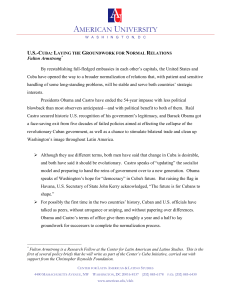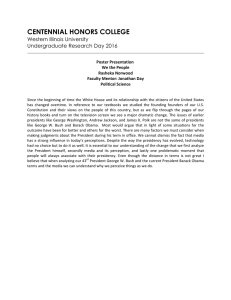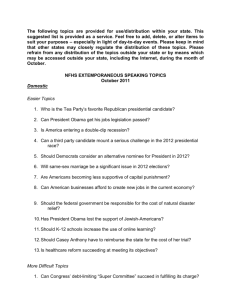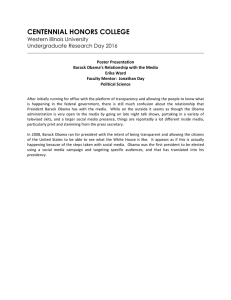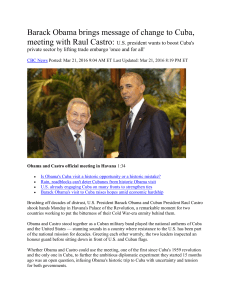January 23, 2015 Key Observations
advertisement
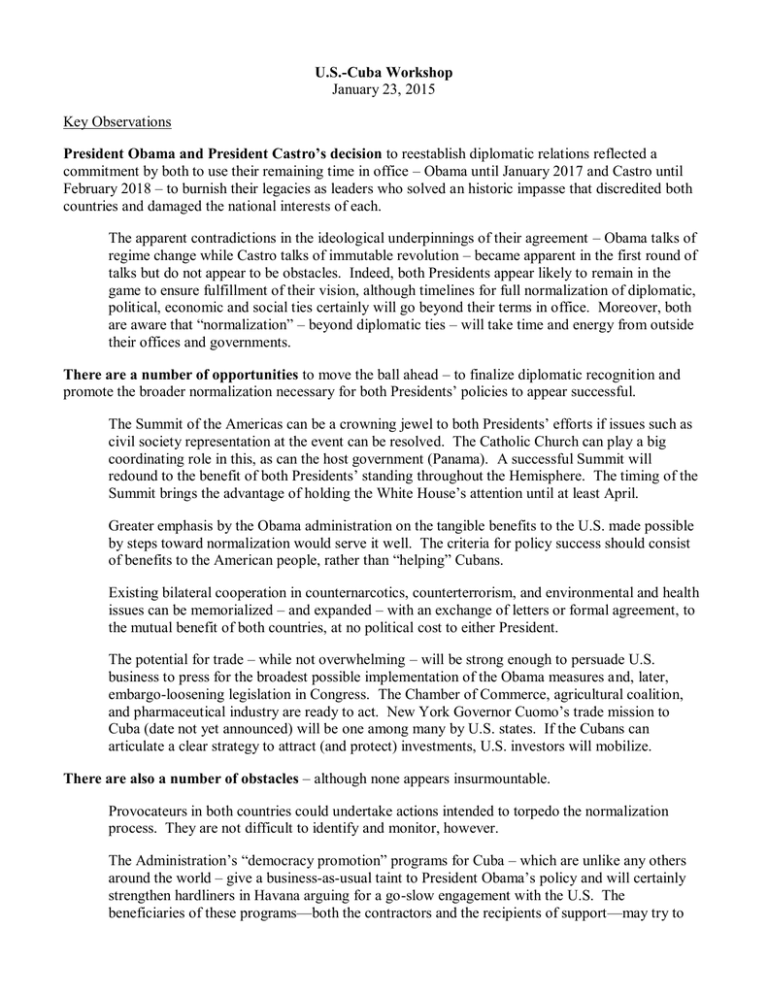
U.S.-Cuba Workshop January 23, 2015 Key Observations President Obama and President Castro’s decision to reestablish diplomatic relations reflected a commitment by both to use their remaining time in office – Obama until January 2017 and Castro until February 2018 – to burnish their legacies as leaders who solved an historic impasse that discredited both countries and damaged the national interests of each. The apparent contradictions in the ideological underpinnings of their agreement – Obama talks of regime change while Castro talks of immutable revolution – became apparent in the first round of talks but do not appear to be obstacles. Indeed, both Presidents appear likely to remain in the game to ensure fulfillment of their vision, although timelines for full normalization of diplomatic, political, economic and social ties certainly will go beyond their terms in office. Moreover, both are aware that “normalization” – beyond diplomatic ties – will take time and energy from outside their offices and governments. There are a number of opportunities to move the ball ahead – to finalize diplomatic recognition and promote the broader normalization necessary for both Presidents’ policies to appear successful. The Summit of the Americas can be a crowning jewel to both Presidents’ efforts if issues such as civil society representation at the event can be resolved. The Catholic Church can play a big coordinating role in this, as can the host government (Panama). A successful Summit will redound to the benefit of both Presidents’ standing throughout the Hemisphere. The timing of the Summit brings the advantage of holding the White House’s attention until at least April. Greater emphasis by the Obama administration on the tangible benefits to the U.S. made possible by steps toward normalization would serve it well. The criteria for policy success should consist of benefits to the American people, rather than “helping” Cubans. Existing bilateral cooperation in counternarcotics, counterterrorism, and environmental and health issues can be memorialized – and expanded – with an exchange of letters or formal agreement, to the mutual benefit of both countries, at no political cost to either President. The potential for trade – while not overwhelming – will be strong enough to persuade U.S. business to press for the broadest possible implementation of the Obama measures and, later, embargo-loosening legislation in Congress. The Chamber of Commerce, agricultural coalition, and pharmaceutical industry are ready to act. New York Governor Cuomo’s trade mission to Cuba (date not yet announced) will be one among many by U.S. states. If the Cubans can articulate a clear strategy to attract (and protect) investments, U.S. investors will mobilize. There are also a number of obstacles – although none appears insurmountable. Provocateurs in both countries could undertake actions intended to torpedo the normalization process. They are not difficult to identify and monitor, however. The Administration’s “democracy promotion” programs for Cuba – which are unlike any others around the world – give a business-as-usual taint to President Obama’s policy and will certainly strengthen hardliners in Havana arguing for a go-slow engagement with the U.S. The beneficiaries of these programs—both the contractors and the recipients of support—may try to obstruct Obama’s policies on Capitol Hill. Norway’s support for “CubaPosible” is a model for open, transparent, inclusive collaboration with civil society in Cuba, as are some U.S. programs in other countries The Bush-era program to persuade Cuban doctors to defect to the United States hinders bilateral medical cooperation and threatens to sour talks. President Obama could suspend it with the stroke of a pen. Hardliners in the U.S. Congress will continue to be rhetorically opposed to improved relations – because they oppose Cuba or Obama – but the Obama policy has plenty of running room before needing legislation to advance. Some members of Congress are likely to oppose a recommendation that Cuba be taken off the list of state sponsors of terrorism, but legislation blocking that overdue step is not likely to pass over a presidential veto. Cuba may have limited capacity to effectively manage the various processes of change in the bilateral relationship. This may slow down the process and dictate the need to proceed sequentially rather than along many fronts at once. Cuban authorities, cautious on economic reform, may respond cautiously to the prospect of U.S. trade and investment – because of limited capacity and concern for the political implications. While Cuba is more prepared politically to respond to a flood of U.S. visitors, its practical capacity – hotel rooms, tourist services – is limited, so the floodgates may open only gradually. The Obama Administration’s restrictions on trade – permitting commerce only with “private entrepreneurs” – keeps the vast majority of Cuban companies and markets off limits. A redefinition of the term would open up sectors dominated by cooperatives and even state companies that have moved to self-financing and self-managing arrangements under Raúl’s reforms. The 2016 U.S. election campaign might give rise to heated rhetoric, but – barring a catastrophic misstep by one government or the other – unlikely to undermine momentum. Polls by FIU, Atlantic Council, and Pew indicate strong support for moving forward. Certified and non-certified property disputes can derail certain aspects of the relationship in the future, although models for resolving them have been validated during normalization processes in Eastern Europe and Asia. Several “wildcards” could impact the normalization process. The passing of Fidel Castro may have a greater impact in Washington than in Havana. Under Raúl, the Cuban people have gotten used to life without Fidel, but his passing could more forcefully mark the end of an era for U.S. policymakers. The passing of Raúl would be much more challenging for Havana because no future leader will have the legitimacy or undisputed authority of a Castro, so progress may stall while the balance of power among new leaders is sorted out. Conservatives opposed to moving quickly ahead on relations with Washington may have more ability to slow the process. Natural or environmental disaster would allow both countries to show deep cooperation. 2
